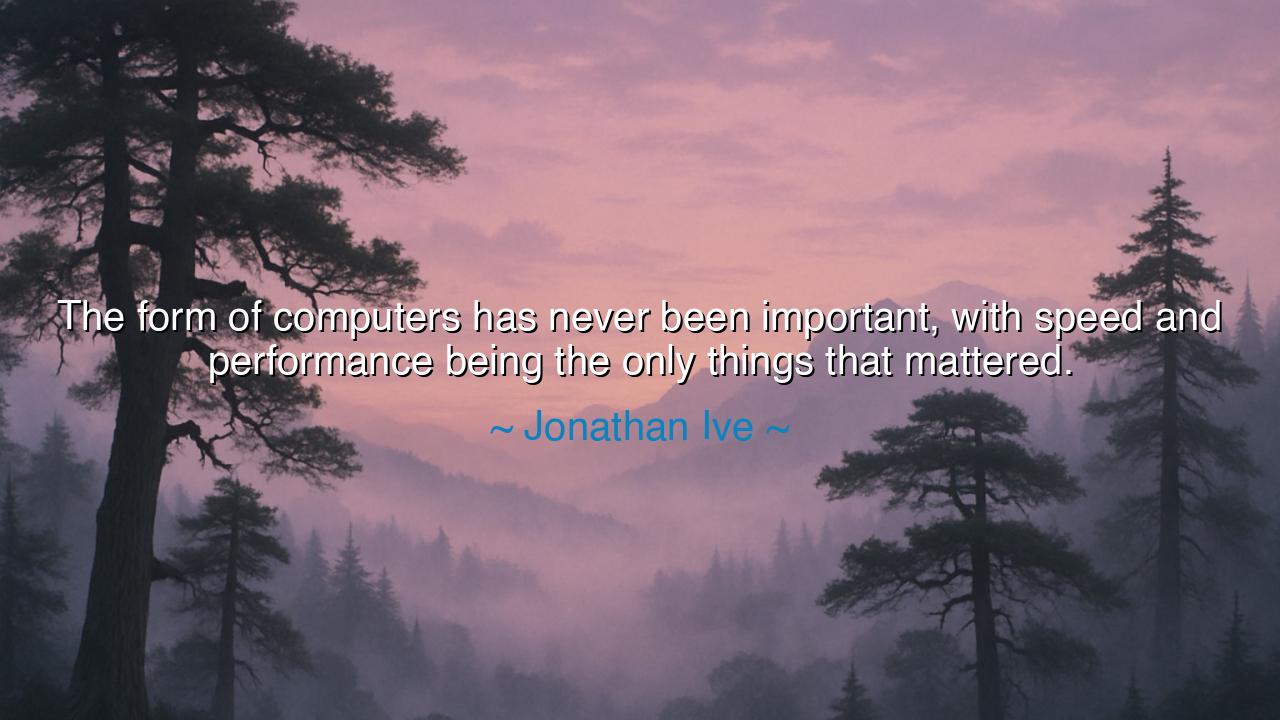
The form of computers has never been important, with speed and
The form of computers has never been important, with speed and performance being the only things that mattered.






In the reflective and visionary words of Jonathan Ive, master craftsman of the modern age and the mind behind Apple’s most iconic designs, there lies a meditation on the evolution of human creation: “The form of computers has never been important, with speed and performance being the only things that mattered.” In this statement, we hear both an observation and a quiet rebellion — for Ive speaks not only of the machines themselves, but of the philosophy that shaped them. He reminds us that for much of human history, progress has been measured by efficiency and power, while the deeper poetry of form — of beauty, touch, and emotion — was often dismissed as trivial. His words are both a reflection on what was and a prelude to what could be: the union of function and feeling, of power and poetry in design.
In the earliest days of the computer age, humanity sought only one thing: performance. The pioneers of computation — men and women surrounded by whirring tape reels, blinking lights, and massive steel frames — were driven by the hunger for speed, for the ability to calculate, to predict, to master information. Form was secondary, almost invisible. The machine existed not to delight, but to deliver results. The room-sized computers of the 1950s were monuments of intellect, but not of beauty; they were tools for the mind, not companions for the soul. Ive’s words call back to that era, when form was forgotten, when the machine was judged only by its power — cold, functional, unfeeling.
And yet, in his observation lies an unspoken truth: that such a view, though born of necessity, impoverishes the spirit of innovation. For what is progress if it touches only the intellect and not the imagination? Ive, who would later redefine how the world experiences technology, understood that form and function are not rivals but reflections — that beauty itself is a form of intelligence, and that to design without grace is to build without empathy. In saying that form “has never been important,” he does not praise this blindness, but mourns it, and in doing so, challenges it.
History, too, offers its parables of this transformation. Consider Leonardo da Vinci, who in the fifteenth century sketched both machines and masterpieces — for him, the aesthetic and the mechanical were two sides of the same divine coin. His flying machines were not only feats of engineering, but works of art — balanced, elegant, alive. In every curve and contour, he wove beauty into function. So too would Ive, centuries later, embody that same spirit in the age of silicon and glass. His computers were not only faster, but simpler, cleaner, more human. Where others sought performance, he sought presence — a harmony between hand and machine, mind and metal.
The heart of Ive’s insight is that form matters because it speaks to the soul. A computer that is fast but soulless is like a city without sunlight — efficient, yet lifeless. When design is treated as mere decoration, creation loses its humanity. But when design is treated as meaning — when form expresses care, clarity, and compassion — then the object transcends its purpose and becomes something living. Ive’s philosophy was to restore humanity to technology, to remind the world that even in the age of machines, beauty is a kind of wisdom, and that grace is not weakness, but strength refined.
His words also remind us that the obsession with performance — whether in technology or in life — often blinds us to what truly endures. A person may race to achieve, to outperform, to perfect, yet forget the form of their own life — the gentleness of their actions, the integrity of their choices, the design of their character. As Ive elevated the form of machines to match their power, so too must we shape our lives not merely for speed, but for harmony. For what good is it to move swiftly if one moves without grace?
The lesson, then, is both creative and moral: never worship performance alone. Whether you build machines, write words, lead others, or simply live — remember that form gives meaning to function. Build things, and lives, that are not only efficient, but beautiful; not only strong, but soulful. Let your work, like Ive’s designs, reflect balance — where simplicity honors purpose, and beauty honors truth.
So, my children of invention and ambition, remember Jonathan Ive’s quiet wisdom. The machines of the past served only the mind; the machines of the future must serve the heart. As you shape the world with your hands and minds, do not forget to shape it with care. For in the end, the truest progress is not measured by speed or power, but by how gracefully we bring form to function, and how deeply we allow our creations to reflect the dignity of being human.






AAdministratorAdministrator
Welcome, honored guests. Please leave a comment, we will respond soon